Lack of coordination with Turkey’s Kurdish parties in the peace process
Bayram Bozyel criticized the DEM Party’s approach, arguing that engaging with Kurdistan-affiliated parties should have been a priority.

Erbil (Kurdistan 24) – As Turkey pursues a political resolution to the Kurdish cause, a noticeable gap has emerged in the political process between the Peoples’ Equality and Democracy Party (DEM Party) and Kurdistan-affiliated parties in Kurdistan of Turkey (Bakur).
Despite engaging with both opposition and ruling parties in Turkey, the DEM Party has notably refrained from meeting with other Kurdish parties. This absence of dialogue has raised concerns among Kurdish politicians, who stress the importance of comprehensive Kurdish representation in the peace process.
Kurdish Parties Criticize Exclusion from Dialogue
Bayram Bozyel, head of the Kurdistan Socialist Party, criticized the DEM Party’s approach, arguing that engaging with Kurdistan-affiliated parties should have been a priority. "They asked us to hold a joint meeting with all Kurdistan parties, yet they visited opposition and ruling parties individually. They could have allocated just five hours for us as well," Bozyel told Kurdistan 24. "It is crucial during this process to consider our proposals and consult with us."
Political analysts argue that the DEM Party’s lack of engagement with Kurdistan-affiliated parties reflects its broader strategy of appealing to the Turkish public rather than prioritizing Kurdish issues in Bakur.
Vedat Koçal, a professor of political science at Dicle University, told Kurdistan 24: "The DEM Party has never placed significant emphasis on Kurdish national cause. Their strategy is to maintain a positive image in Turkish public opinion rather than align with the positions of Kurdistan parties."
Koçal further highlighted a fundamental ideological difference between the DEM Party and Kurdistan parties. "While some Kurdish parties view Kurdistan’s division as a result of the Lausanne and Sykes-Picot agreements and call for a legal resolution, the DEM Party leans toward the broader concept of a democratic state rather than pursuing a distinct Kurdish nationalist agenda."
Uncertainty Over Future Engagement
It remains unclear whether the DEM Party will engage with Kurdistan-affiliated parties in Bakur after Newroz. However, these parties assert their right to be informed about the discussions held during the recent meetings and seek clarity on any potential agreements made behind closed doors.
As Turkey navigates its political approach to the Kurdish issue, the absence of direct engagement with Kurdistan parties raises questions about the inclusivity of the process and its potential outcomes for Kurdish representation in Turkey’s evolving political landscape.
